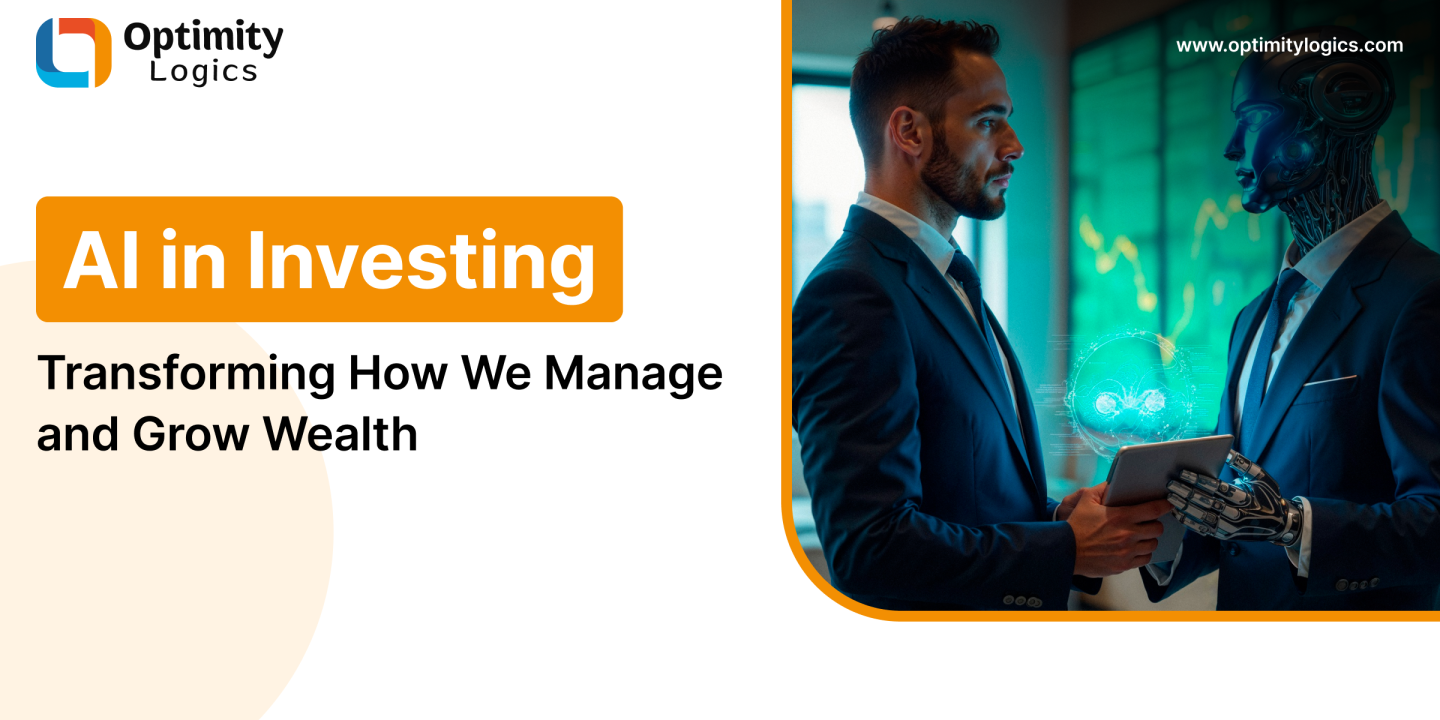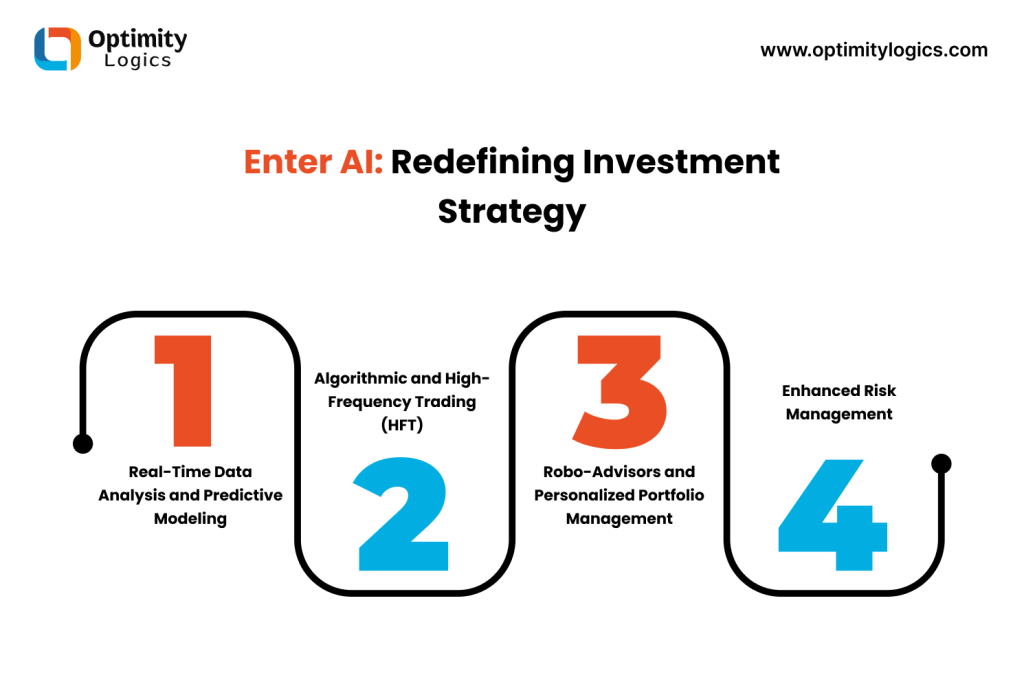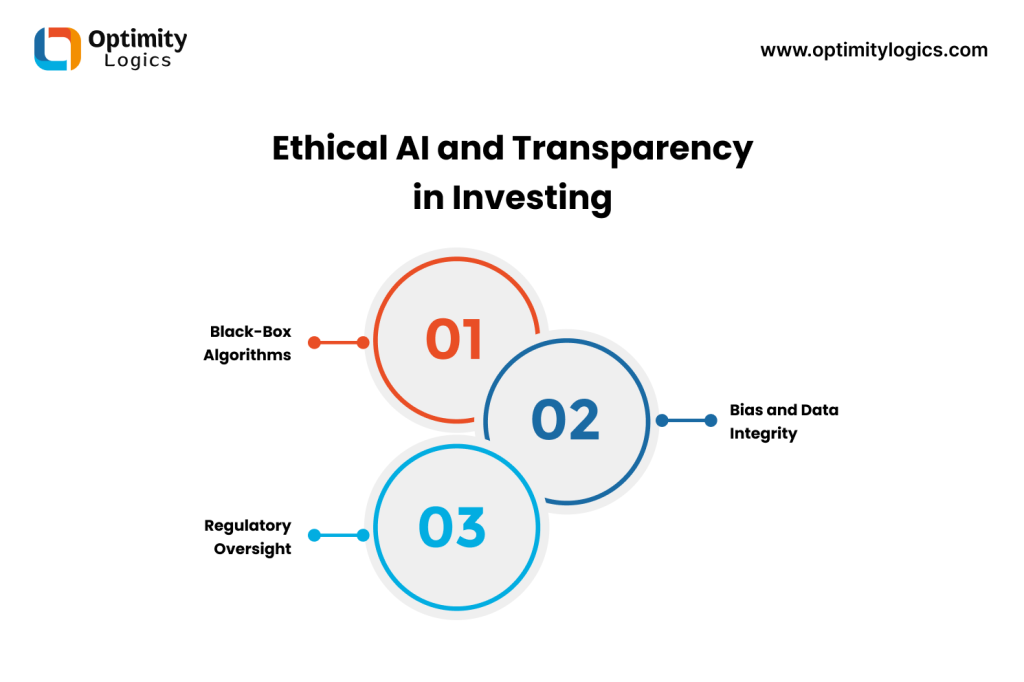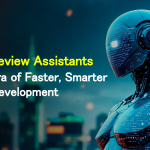
Artificial Intelligence (AI) has become one of the most revolutionary forces in modern technology, reshaping entire industries—from healthcare and education to logistics and customer service. Among the most transformative applications of AI lies in the world of finance, particularly investing. Once dominated by human intuition, experience, and research, investment strategies are now increasingly guided by algorithms, data-driven models, and machine learning technologies.
This shift has not only democratized access to sophisticated financial tools but also introduced unprecedented precision and scalability in wealth management. In this blog, we’ll explore how AI is transforming the investment landscape, what this means for investors, and where the future of smart investing is headed.
The Traditional Investment Landscape: Limitations and Challenges
For decades, investment management relied heavily on manual analysis, historical data interpretation, and economic forecasting done by financial analysts and portfolio managers. While this approach produced many success stories, it came with limitations:
- Human bias and emotion often clouded judgment.
- Market reactions were difficult to predict in real time.
- Access to sound investment advice was limited to high-net-worth individuals.
- Data processing capabilities were constrained by manual effort.
These challenges created inefficiencies in wealth creation, risk assessment, and financial planning—especially for average investors.

Enter AI: Redefining Investment Strategy
AI has the power to change all of that.
From robo-advisors and algorithmic trading to predictive analytics and risk modeling, AI tools are revolutionizing how individuals and institutions invest. Here’s how:
1. Real-Time Data Analysis and Predictive Modeling
AI thrives on data. It processes millions of data points—stock prices, economic indicators, social media sentiment, news feeds, and company performance reports—at speeds no human analyst can match.
This enables:
- Real-time trading decisions
- Forecasting of asset prices
- Early detection of market volatility
With machine learning algorithms improving through exposure to new data, predictions become more accurate over time.
2. Algorithmic and High-Frequency Trading (HFT)
AI-driven trading systems can execute thousands of trades per second, taking advantage of market fluctuations in real time. These trades are governed by sophisticated algorithms that assess risk, analyze price patterns, and optimize profit margins with millisecond precision.
This approach minimizes latency and maximizes returns for investors, particularly institutional ones, by capitalizing on fleeting opportunities that human traders might miss.
3. Robo-Advisors and Personalized Portfolio Management
One of the most popular AI applications in investing is the use of robo-advisors. These are digital platforms that provide automated, algorithm-driven financial planning services with minimal human supervision.
Benefits include:
- Low-cost investment management
- Customized portfolios based on risk tolerance and financial goals
- Automatic rebalancing and tax optimization
Platforms like Betterment, Wealthfront, and Schwab Intelligent Portfolios have made investing accessible to the masses, regardless of their net worth.
4. Enhanced Risk Management
Risk is an inherent part of investing. AI helps mitigate it by identifying patterns and anomalies in historical and current data.
Some risk-related AI capabilities include:
- Predicting credit risk for loan applicants
- Monitoring market conditions to adjust portfolio strategies
- Identifying geopolitical or economic events that may impact investments
These tools allow investors to make informed decisions and reduce exposure to unexpected losses.
The Democratization of Investment Opportunities
Historically, financial tools and market insights were reserved for elite investors with access to top-tier advisors. AI has changed that by leveling the playing field.
Now, with the aid of mobile applications and web platforms, everyday investors can:
- Receive personalized financial advice
- Monitor portfolio performance in real time
- Access global markets from anywhere in the world
This widespread access to investment tools has led to a broader participation in wealth creation. Younger generations, especially millennials and Gen Z, are increasingly turning to AI-powered apps to begin their investment journeys.

Ethical AI and Transparency in Investing
Despite its many benefits, the use of AI in finance also comes with ethical and regulatory concerns:
1. Black-Box Algorithms
Many AI models, especially deep learning networks, operate in a “black box” manner—providing outcomes without clear reasoning. In a sector as sensitive as investing, this lack of transparency can be problematic, especially during losses or unexpected shifts.
2. Bias and Data Integrity
AI is only as good as the data it’s trained on. Biased or inaccurate data can lead to flawed investment decisions. Financial institutions need to ensure high-quality, diverse datasets to reduce bias.
3. Regulatory Oversight
As AI takes on more decision-making roles, regulatory bodies are catching up to ensure transparency, fairness, and ethical usage. Compliance and auditability are crucial when AI is involved in managing people’s life savings.
The Role of Technology Service Providers
As AI becomes more deeply embedded in investment strategies, there is an increasing demand for robust digital platforms that support these services. This is where technology partners step in.
Financial firms often collaborate with agencies that offer mobile app development services to create secure, intuitive, and AI-powered investment applications. Whether it’s a robo-advisor for beginners or a professional-grade trading tool, mobile platforms help bring AI’s capabilities directly into the investor’s pocket.
Likewise, web development services play a critical role in designing secure, scalable investment dashboards and platforms. These web interfaces enable users to visualize portfolios, receive real-time alerts, and interact with AI-driven insights without friction.
One of the standout companies helping bridge this gap between AI and usability is Optimity Logics, known for delivering cutting-edge digital solutions tailored to the finance and investing sectors. With experience in integrating AI capabilities into both web and mobile platforms, they enable fintech firms to deploy intelligent systems that improve investor experience and ROI.
Case Studies: AI Success Stories in Investing
1. Wealthfront’s AI-Based Financial Planning
Wealthfront uses AI to automate everything from budgeting and saving to investing and retirement planning. Their AI adapts user strategies based on lifestyle changes and real-time financial conditions.
2. Kensho’s Market Intelligence
Used by Goldman Sachs, Kensho’s AI processes natural language data (such as news articles and SEC filings) to predict market movements, providing actionable insights for traders.
3. Sentiment Analysis by Dataminr
Dataminr uses AI to analyze news and social media to identify real-time risks and opportunities. It provides early warnings about events that could impact global financial markets.
The Future of AI in Investing
We are just scratching the surface of what AI can do in the investment space. The next frontier may include:
- Emotion AI to better understand investor psychology
- Quantum computing to process data at unimaginable speeds
- AI-powered ESG (Environmental, Social, Governance) scoring to align portfolios with sustainability goals
- Hyper-personalized financial planning using digital twins and behavioral analytics
As AI evolves, its integration into investing will become more seamless, intuitive, and indispensable.
Conclusion
AI is not just an enhancement to traditional investing; it is a paradigm shift. It brings speed, accuracy, personalization, and access to the world of wealth management. With intelligent algorithms, data-driven strategies, and intuitive platforms, investors can now manage their wealth more efficiently and confidently than ever before.
However, the transformation is not without its challenges. Ethical considerations, regulatory frameworks, and data integrity will remain central to ensuring AI continues to serve in the best interest of all stakeholders.
As digital innovation continues to unfold, firms that embrace AI will lead the charge in making investing smarter, faster, and more inclusive. Whether you’re a beginner investing through a mobile app or an institution managing millions, the future of wealth creation is unmistakably intelligent—and AI is the engine powering it.












